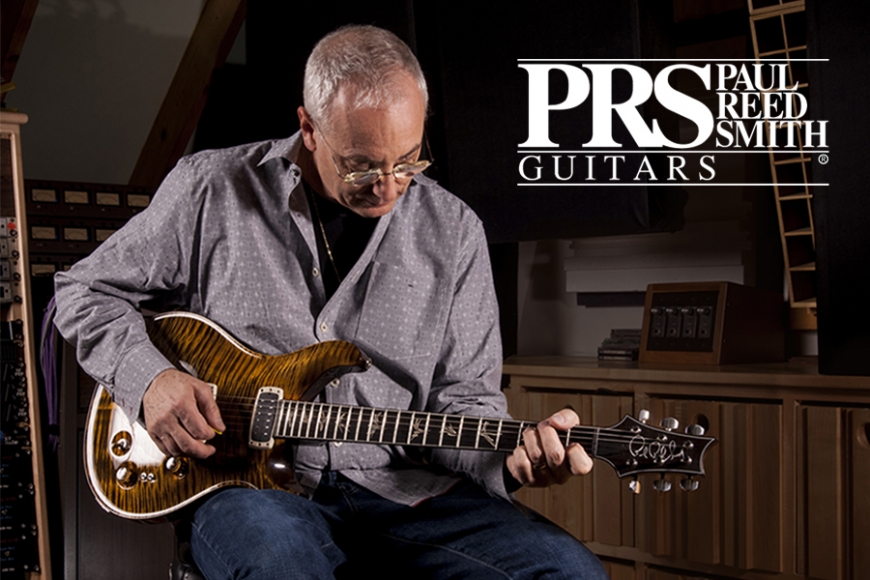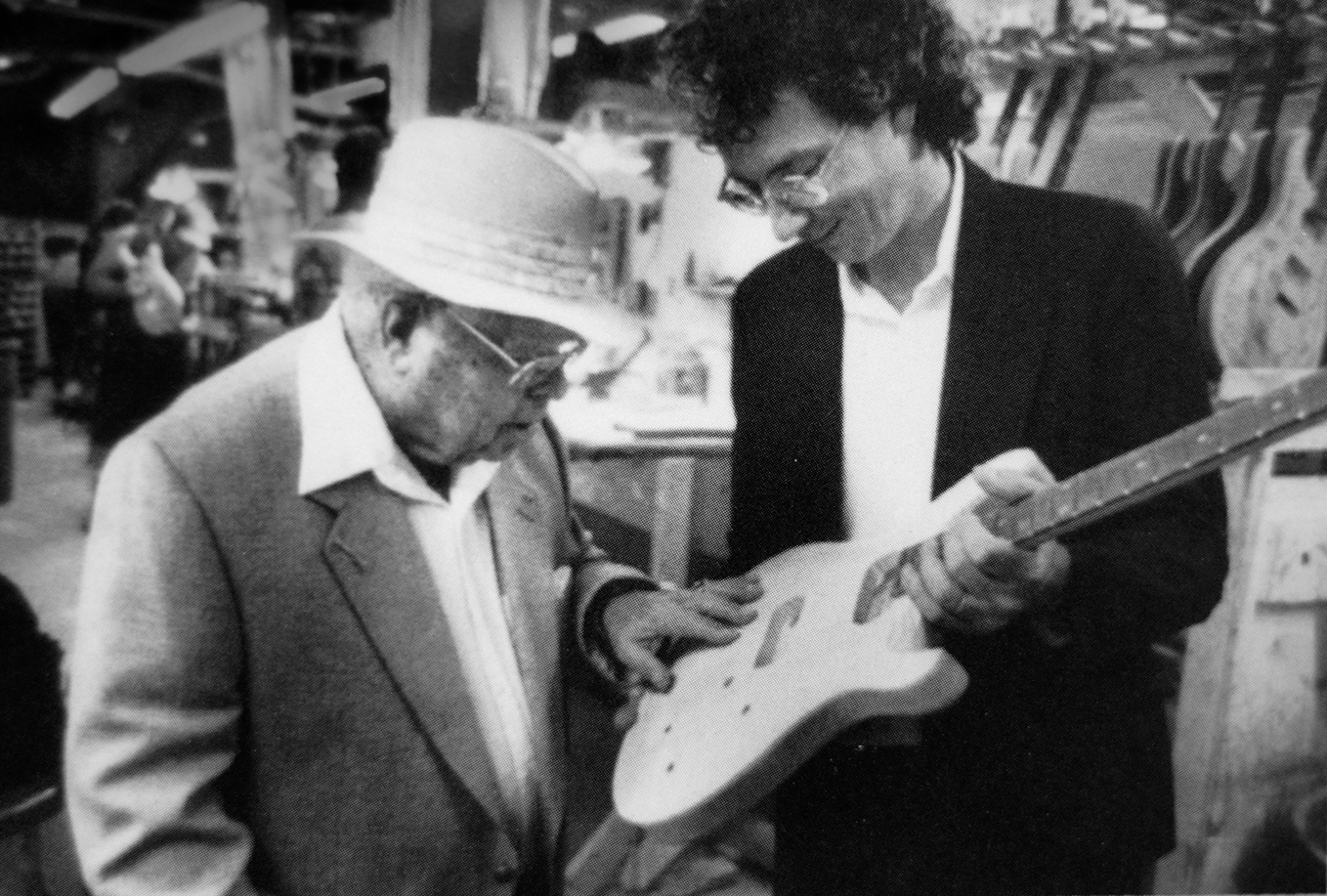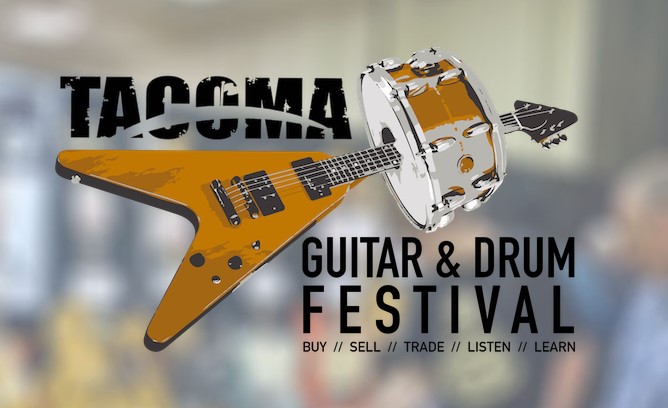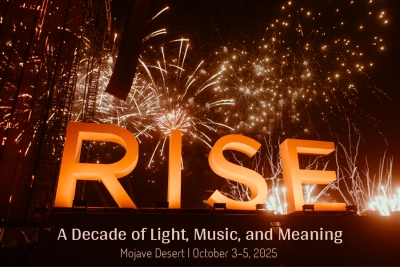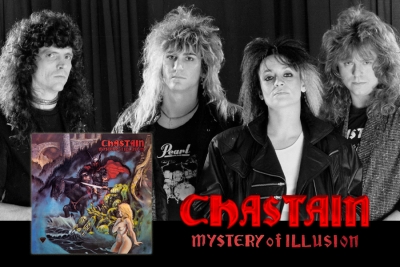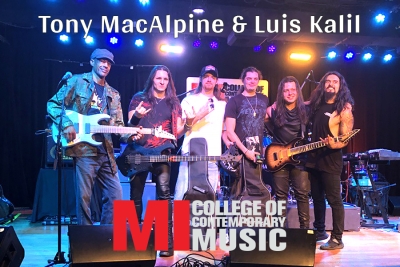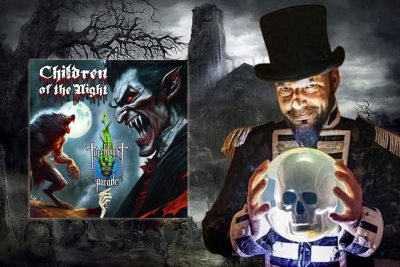GA: I attended your lecture yesterday about your story and the history of the electric guitar: how it evolved and how it changed the musical landscape, the whole music market from big-band jazz era to three - four-piece rock bands that dominate up to date; and in pop music the guitars are there as well.
PRS: Yes, I told everybody this information like you needed 13 or 14 people in a big band, and all of a sudden, Elvis shows up, and he needs three people.
GA: How did you get into the guitar making? You were really young, and that was your entire life. What was your story?
PRS: Yeah, I could easily see myself making guitars, but playing guitar was not easy for me. I would much rather be a guitar player, but guitar making was easy for me, so I did that. I enjoyed it. I don't know… which is kind of some people know really early what they want to do, and some people don't find out until later in life. I was young, I was early, and I am lucky. There is a story that Christina Aguilera
used to sing to her dolls on her bed - she knew early.
-
 Paul Reed Smith and Ted McCarty
Paul Reed Smith and Ted McCarty
Paul Reed Smith and Ted McCarty
Paul Reed Smith and Ted McCarty
-
 Paul Reed Smith w/ a “pre-factory” guitar, early 1980’s
Paul Reed Smith w/ a “pre-factory” guitar, early 1980’s
Paul Reed Smith w/ a “pre-factory” guitar, early 1980’s
Paul Reed Smith w/ a “pre-factory” guitar, early 1980’s
-
 Paul Reed Smith and Carlos Santana, mid 1980’s
Paul Reed Smith and Carlos Santana, mid 1980’s
Paul Reed Smith and Carlos Santana, mid 1980’s
Paul Reed Smith and Carlos Santana, mid 1980’s
-
 Paul Reed Smith checking guitars, early 1990’s
Paul Reed Smith checking guitars, early 1990’s
Paul Reed Smith checking guitars, early 1990’s
Paul Reed Smith checking guitars, early 1990’s
-
 Paul Reed Smith with Mark Tremonti (Creed), early 2000's
Paul Reed Smith with Mark Tremonti (Creed), early 2000's
Paul Reed Smith with Mark Tremonti (Creed), early 2000's
Paul Reed Smith with Mark Tremonti (Creed), early 2000's
View the embedded image gallery online at:
https://suleyera.com/music-life/gear-studio/paul-reed-smith-rock-n-roll-is-alive.html#sigProId629d7b9f3d
Photo credits: PRS Guitars © PRS Guitars 2021
https://suleyera.com/music-life/gear-studio/paul-reed-smith-rock-n-roll-is-alive.html#sigProId629d7b9f3d
GA: Tell us a few words about Ted McCarty and what role he played in your life.
PRS: Ted was a vice president and then a president of Gibson from 1948 until 1966, he ended up being a friend and a mentor and a kind of sage for PRS, and he gave us a nod of approval. It was all good.
GA: We talk a lot about mentorship and the role of people who are masters and who helped younger artists and younger craftsmen.
PRS: It happens a lot! Nobody over 50 wants to die with great skills and not hand them on to somebody. Nobody. So, a young person is asking the older gentleman or a woman how to do it, isn’t it a distinct advantage because the older person doesn't want to die with that and keep the skills, it’s awesome!
GA: It must be great for a young luthier like yourself when you started in mid-70’s?
PRS: Oh, you called me a younger luthier at 62 years old?
GA: Well yeah, when you started in 70’s and now you are a master luthier, though you still look young…
PRS: You accused me of being young, and somebody else here accused me of becoming elder statesmen…
GA: Who said that?
PRS: The whole bunch of people – they accuse me of dying every day!
GA: No way!
PRS: Oh, no, I’m telling you!
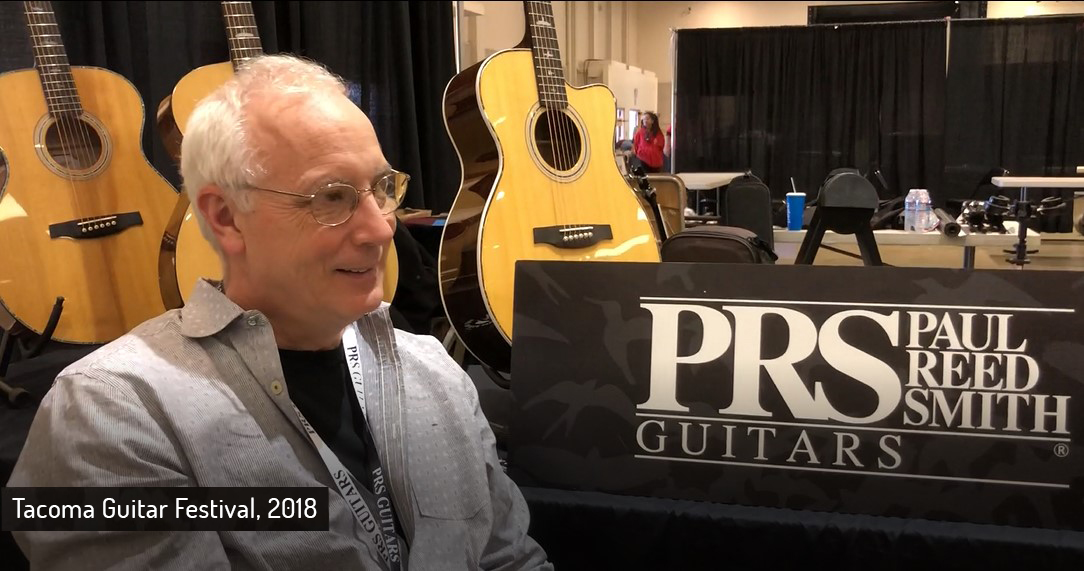 Paul Reed Smith at the Tacoma Guitar Festival, April 2018 © 2018 Suléy Era
Paul Reed Smith at the Tacoma Guitar Festival, April 2018 © 2018 Suléy Era
GA: But you started as a young luthier, right? You started with a legend - Ted McCarty, who was already a legend by that time, and that helped you to see somebody like him to master your own.
PRS: I’ve got to know how they did it in the 50’s, and it was very helpful to be able to know. Encyclopedia of information!
GA: The next question would be interesting. Your company was established in the mid 80’s as PRS brand, and I would assume it was not easy timing to get in because rock music was on another turnaround...
PRS: That was the perfect time because Fender was out of business - Kramer was in, Gibson was not doing very well - Steinberger was hot. Jackson was hot. It was a perfect time for me to get in, but the window of opportunity was very narrow; I got in that window perfectly at the right time.
GA: And the rock music at that time, especially heavy metal music, was very popular, and then the grunge came in, so a lot was going on in the music scene as well.
PRS: It’s normal, but I make tools for any kind of music, so it's okay. The guitars - you can play jazz on them, you can play grunge or metal, all on the same guitar. The guitar is a guitar! But the problem with some of the guitars they hum badly, so they don't work for metal because you have to use a gate and it doesn’t work.
 Photo: PRS Guitars © PRS Guitars 2021
Photo: PRS Guitars © PRS Guitars 2021
GA: What you can say in the perspective of growing your brand through the years and brand sustainability, especially nowadays because we see decline of some bigger names, you know the kind of shaking up. We have different changes going on the market as far as guitar making itself and music market also. Unlike in the sixties, seventies, eighties and even nineties, what they say there are no real guitar gods or examples for younger musicians to be motivated to be guitarists and to keep guitar sales going.
PRS: Some of that is true, but right now you’ve got Monte Money, you’ve got John Mayer, and you've got all kinds of guitar players out there right now that people look after, but it's not the height of the Carlos (Santana), and Eddie (Van Halen), and Steve Vai - all that stuff is gone.
It's not like that, but John Mayer is a monster name in our industry right now, you’ve got Jimmy Herring and all kinds of wonderful guitar players, and I go into schools, and they still teach Hendrix and Clapton and Page, and you know Tony Iommi - of all weird things because people want to play Black Sabbath tunes – ta, da, da-da-da!.. You know it’s great, so it’s different, I don’t know... I think there are a lot of fine guitar players out there.
GA: But not so many who can really produce that original music that we could say – hey, there is something new is coming up, and that is what would cause a new generation to get from their cell phones and computer games and start learning guitar playing.
PRS: My son learns music from his phone, you know, this device that this is being filmed is extraordinary – we can pull it down and talk to China right now, I mean, and she's filming with it! You just wouldn't even know, so it's OK to use all its advances, but I see a lot of young guitar players and a lot of women playing bass and guitar - it's awesome what is going on with the women. One of the best bass players alive is female - Rhonda Smith is playing in Jeff Beck's band; hello man!
GA: Yeah, and Lauren Taneil, a lady who is playing bass with Beyonce.
Paul Reed Smith:
Everybody's been trying to say that rock and roll is dead – it’s not dead!
It is alive and well!
PRS: Yeah, Lauren is Beyonce's bass guitar player, and she plays PRS, which I think is lovely. So I see it as different but the same. Everybody's been trying to say that rock and roll is dead – it’s not dead! It is alive and well! It’s true! It is not coming from that nobody is being interested. That is because people are highly interested. Things are just changing. It’s okay.
GA: Coming back to the guitar sales and guitar making in the modern markets with Asian market flooding, with smaller companies… for example, I work with a smaller luthier that makes unique boutique guitars, but you also started as a boutique shop, right? And you went all the way from the boutique store…
PRS: I wouldn’t call it a boutique shop. I would have called it a one-room luthier - handmade guitar place.
GA: So, it was even smaller than that, right? So how was it scaling up to becoming a worldwide brand?
PRS: Huh, it was an extraordinary learning curve with as much help as you could possibly imagine. I've got 280 people there, and I've learned as much from them as they learned from me. It’s been really difficult. If it wasn't for Warren Esanu, a godfather of my children and the person who helped me to begin PRS, we would have never made it. It was very helpful in difficult times. Businesses are on the edge of losing it a lot; you hear businesses going out of business all the time. You have to fight through those moments using all your experience, intelligence, and help as you could possibly get.
GA: So, in your opinion, why a lot of big companies, big brands, retailers, and manufactures are complaining about the industry…
PRS: Nobody is complaining. In my opinion, if they are complaining - they are equal to what they were in 2008 - things are back! I mean our industry… Did you go to NAMM? Well, there were a lot of people there. Sweetwater is growing; the internet business is growing, Thomann is growing in Europe - things are going well.
GA: But there were articles about Guitar Center and Gibson having problems…
PRS: These are individual issues that's not industry wide. I mean, look, if we lose some of the big icons, it would be bad for our industry. I think it's okay – the story is changing, to have it remain the same that's nuts! Nothing stays the same. Nothing ever stays the same. I’m sitting here talking to a guitar person from Moscow! That didn’t happen 5 minutes ago! It is a brand-new thing, right?
GA: But that creates a buzz in the media, and it is confusing to people, they’re thinking oh, it is a disaster, rock’n’roll is dead. I read that rock’n’roll has “died” back in 1979 when I was a teenager, and I was devastated because I read this article…
PRS: And you believed? They can say whatever they want – I don’t believe in fake news, and you can’t believe it all. I am sorry, but there are a lot of people around here buying staff, including me! I had a good time!
GA: No, I did not believe that, but I was frightened a little bit. So, what do you think about the Tacoma show? It is a local show, but…
View the embedded image gallery online at:
https://suleyera.com/music-life/gear-studio/paul-reed-smith-rock-n-roll-is-alive.html#sigProIdcf27180514
Photo Credits: Tacoma Guitar & Drum Festival, © 2021 The Adolph Agency, Inc.
https://suleyera.com/music-life/gear-studio/paul-reed-smith-rock-n-roll-is-alive.html#sigProIdcf27180514
PRS: It’s lovely, I learned a lot. There should have been more high-end buyers here. There were some extraordinary pieces of gear here they should have sold. There was a Soldano amplifier here that should be sold; there was ESV30 that should be sold… There was a Silvertone amplifier in the box! It had SEARS on the box! I've never seen the box - I've been in this industry my whole life! There were all kinds of cool stuff; I mean, did you walk around?
GA: Of course! Actually, I played that Soldano amp there yesterday, the big black one!
PRS: The black one is Hot Rod 50. There was another, the yellow one as well. There were finds all over this room.
GA: There were great artists at this show, like David Ellefson from Megadeth. It is not often you can see artists of that scale just meeting with fans, talking to the audience, and sharing their experiences.
PRS: There were a lot of people at my event too. I was surprised, and I tracked it; there were about 300 people and only about six people left, and about 30 or 40 people came in, so that's more positive than negative.
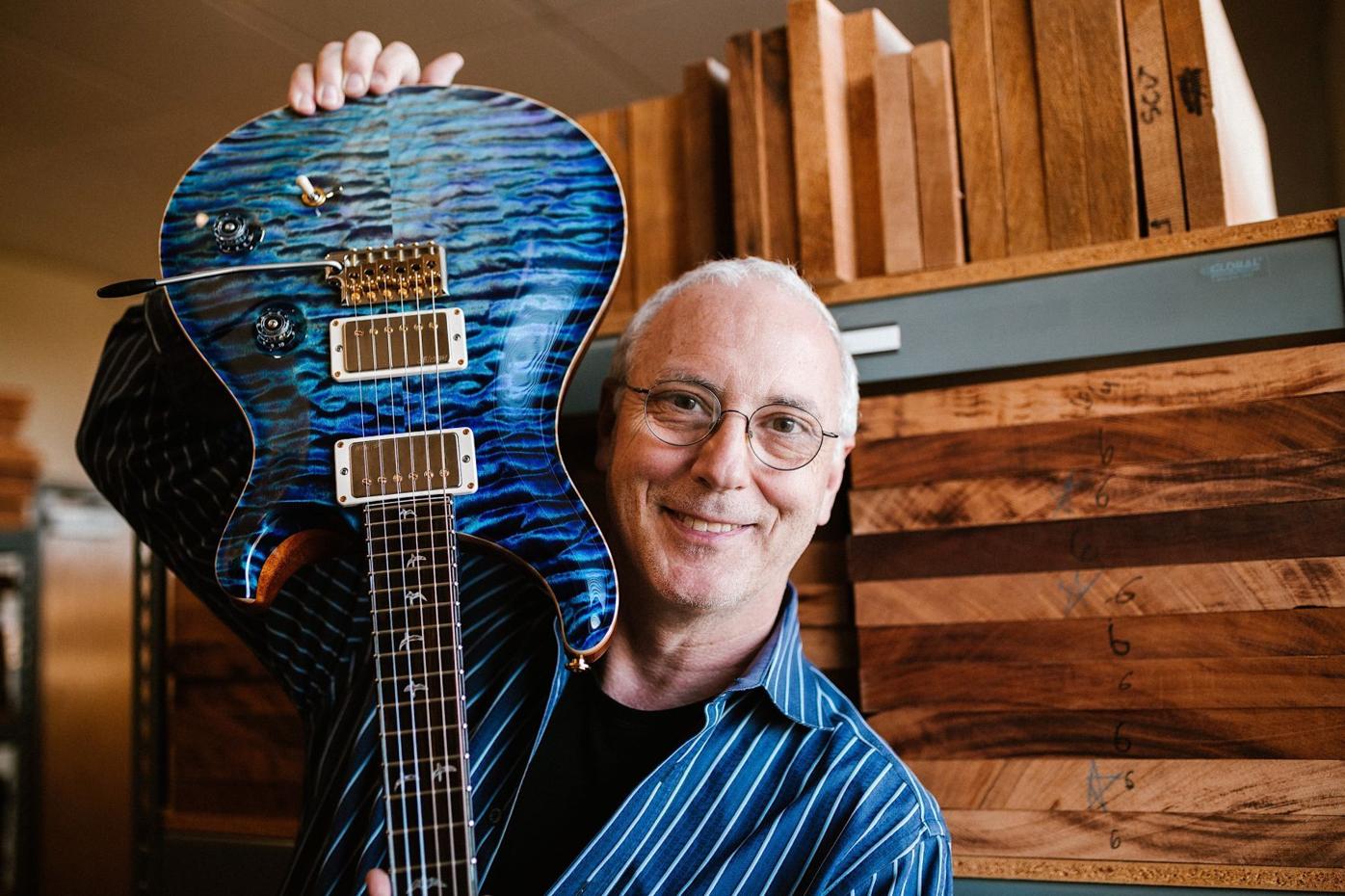 Paul Reed Smith. © PRS Guitars 2021
Paul Reed Smith. © PRS Guitars 2021
GA: Do you know any Russian bands and musicians who play PRS guitars?
PRS: I’ve heard a lot. Is that true?
GA: What about Black Obelisk? They're my friends; I worked with them back in 92 – 94.
PRS: Oh, I’ve heard about them! You need to go to Russia.
GA: Yeah, I was there two years ago…
PRS: You were there two years ago, but you haven’t been to Israel yet? I’ve been to Israel several times. I like it. You know what they do in Tel Aviv? They surf the waves that are coming in from Italy, and they surf, and you wouldn't think of that! I ate at a restaurant that had been opened for 1300 years in Jaffa! It was awesome!
GA: Well, this interview will be seen in Israel and Russia, and the guys who play PRS guitars will see it.
PRS: I've never been there, but I want to go. Look, there was an American, Mark Twain, who said in the early 1900’s that the number one way to erase prejudice is to travel. If you want to know about other people and other places you need to travel, and I go to China, I go to Japan, I travel a lot to Europe, and to Mexico and Canada. I’ve been to a lot of places, but I've never been to Africa, I’ve never been to India and places like Russia I haven’t been but of the places I've been - I was told how it was as a child, it's not the way I was told, it's different than I was told and in some ways it's beautiful.
I’d just give you an example: if you get on an airplane and you fly over Germany, it doesn’t look like looking down in America. In Germany, you got a town, which is round, and a big forest and another town is round and a big forest. In America, it's all spread out. You fly over the Netherlands, they’ve been busy bees, they got water around, and it is clean as a whistle, right! And you fly over England, and that looks really different, and you fly over America, and you fly over all those places, and they look very different from the air because it's a different way of colonizing the land. Did you fly over to Japan? Oh, you need to go to Japan.
GA: No, no, not Japan, but I flew over Europe a lot and when you said about Holland, Netherlands that's actually interesting because you barely see any undeveloped land in there; everything is developed there, it is so dense.
PRS: But it is beautifully handled! You know, I flew over it, I was flying over Holland, and I looked down wow – busy bees! Because of all those windmills that they have there are for getting rid of the water, not for grinding up bread... so it is fascinating, absolutely fascinating! So, for me and for anybody watching this - travel will change your ways.
And, there's been some heartbreaking news with the Syrian refugees and a lot of the other stuff, you know, I don't enjoy all the news and difficulties that are going on between the governments, you know that stuff. But I think that the people when I go to each of the countries are good-hearted. I'm sure if I go to Russia, I'm gonna find beautifully hearted people, and I know that they're beautifully hearted people in all the places that I listed.
So for me, I'm an American, but I kind of take a world view of this point. Guitar making, you know, we have to make it for all countries.
GA: Let's cut it short, so my last question will be now… as a global name, as a global brand, it's probably each guitar is kind of a piece of your heart, your soul… so do you feel your presence everywhere through your guitar making?
PRS: No, it comes and goes… we were definitely strong here at this show, and we’ve been at shows at NAMM where we were completely ignored, and we were at the shows where we were the hottest thing in town… it depends on what's going on… John Mayer came one time to NAMM, and there were two thousand people just trying to get a picture on the phone like this; there was Carlos Santana. I saw him getting rush lines, so we had a group of people around him to protect him. He didn’t even know what had happened.
It changes. Right now, we're doing really well. There's a saying in America: nobody tackles you unless you have the football! Right now, we have a football, so it’s good. But I don't know, maybe if I don't have the football and we don’t get tackled. You know, as a global brand, no, I don’t feel presence everywhere, but I am seeing it grow. Do you see it grow?
GA: Absolutely, yeah, well I know the brand has a reputation and when people recommend PRS as one of the choices, one of the major choices and not just people - the musicians, the artists, their followers recommend the brand and that makes it solid.
PRS: I'm sorry it's soapboxing you want to cut it short.
GA: All right, thank you, Paul!
Watch Suley TV Live interview with Paul Reed Smith on YouTube:
https://youtu.be/mmbhjB9Jz5Y
Follow PRS Guitars:
Web: https://prsguitars.com
FB: https://facebook.com/prsguitars
IG: https://instagram.com/prsguitars
Twitter: https://twitter.com/prsguitars
YouTube: https://youtube.com/prsguitars
Follow Tacoma Guitar & Drum Festival:
Web: https://www.tacomaguitarfestival.com/
FB: https://www.facebook.com/TacomaGuitarFestival


